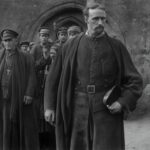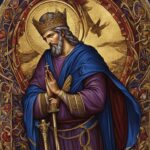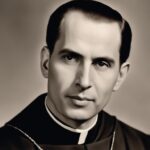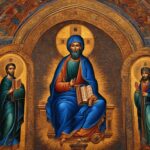St. Edmund Campion was an English Catholic priest and martyr who fearlessly defended the Catholic faith during the Elizabethan era in Tudor England. Born in London in 1540, Campion was a highly educated scholar who later joined the Jesuit order and became ordained as a priest. He felt called to bring the Gospel to England, despite the dangers and strict anti-Catholic laws in the country. Campion’s bravery and unwavering faith led to his eventual arrest, torture, and execution for treason, making him one of the Forty Martyrs of England and Wales.
Key Takeaways
- St. Edmund Campion was a Catholic saint and Jesuit martyr who defended the Catholic faith during the Elizabethan era in Tudor England.
- Despite the dangers and strict anti-Catholic laws, Campion bravely brought the Gospel to England.
- He faced arrest, torture, and execution for treason, becoming one of the Forty Martyrs of England and Wales.
- Campion’s life and martyrdom serve as an inspiration for his unwavering faith and dedication to the Catholic Church.
- His legacy continues to inspire Catholics worldwide, particularly within the British Jesuit Province.
Early Life and Background
St. Edmund Campion, born in London in 1540, came from a family with an appreciation for knowledge and education. His father was a bookseller, providing Edmund with access to a wide range of books and learning materials. Growing up in this environment, Edmund developed a deep love for knowledge and an insatiable curiosity.
Edmund’s passion for learning led him to pursue higher education at Oxford University. Known for his sharp intellect and dedication, he quickly gained recognition as one of the brightest young scholars at the university. His time at Oxford shaped his theological and intellectual foundation, setting the stage for his future religious endeavors.
While Edmund Campion’s early life may have seemed ordinary, his upbringing in a family that valued education and his experiences at Oxford laid the groundwork for his extraordinary journey of faith and service to the Catholic Church.
Call to Religious Life
After completing his studies at Oxford, Edmund Campion felt a strong calling to dedicate his life to a higher purpose. This profound spiritual awakening led him to join the Jesuit order, a religious order within the Catholic Church known for its commitment to education, ministry, and mission work.
Edmund’s decision to become a Jesuit marked a turning point in his life. It was a calling that allowed him to combine his intellectual pursuits with his deep-seated desire to serve others and spread the teachings of the Catholic faith. Through his devotion and dedication, he became an inspiration to all who crossed his path.
Call to Religious Life
After completing his studies, St. Edmund Campion joined the Jesuit order and was ordained as a Catholic priest. His time in the Jesuit order exposed him to the missionary work of the Catholic Church, sparking a deep desire within him to bring the Gospel to England, even in the face of persecution.
St. Edmund Campion’s call to religious life was a pivotal moment in his journey of faith. Joining the Jesuit order allowed him to not only deepen his own spiritual practice but also embark on a mission to serve and spread the Catholic faith. As a Jesuit, Campion immersed himself in the rigorous training and disciplined lifestyle of the order, preparing himself intellectually, emotionally, and spiritually for the challenges that awaited him.
The Jesuit order, founded by St. Ignatius of Loyola, emphasized education, missionary work, and individual spiritual growth. It provided a supportive community of like-minded individuals who shared a common mission and commitment to the Catholic Church. For St. Edmund Campion, this sense of belonging and shared purpose within the Jesuit order was instrumental in shaping his path as a Catholic priest and missionary.
Through his involvement with the Jesuit order, St. Edmund Campion became acquainted with the struggles faced by Catholics in England during the Elizabethan era. The country was undergoing a period of intense religious conflict, with the Protestant Church of England asserting its authority and suppressing the Catholic faith. Despite the dangers and risks involved, Campion felt compelled to respond to the call of his faith and bring hope, inspiration, and the teachings of the Gospel to his fellow countrymen.
“The voice of history is a solemn warning that no nation can prolong the splendor and prosperity of its reign when religion, deprived of its rights, is either oppressed by an unjust, cruel, and dominant sect, or when it is suffered to languish in doubt and neglect.”
St. Edmund Campion’s courageous decision to become a Catholic priest and join the Jesuit order exemplifies his unwavering commitment to his faith and the values of the Catholic Church. It was this call to religious life that set him on a path towards martyrdom, as he dedicated himself to ministering to Catholics in secret and defying the anti-Catholic laws imposed by the state.
St. Edmund Campion’s Journey to the Jesuit Order
| Year | Event |
|---|---|
| 1563 | Joins the Jesuit order |
| 1564 | Ordained as a Catholic priest |
| 1566 | Assigned to mission work |
St. Edmund Campion’s journey to the Jesuit order was marked by commitment, sacrifice, and a deep conviction to serve God and the Catholic community. As he embarked on this path, he carried with him an unyielding determination to live out the teachings of Christ and bring hope to a nation divided by religious conflict.
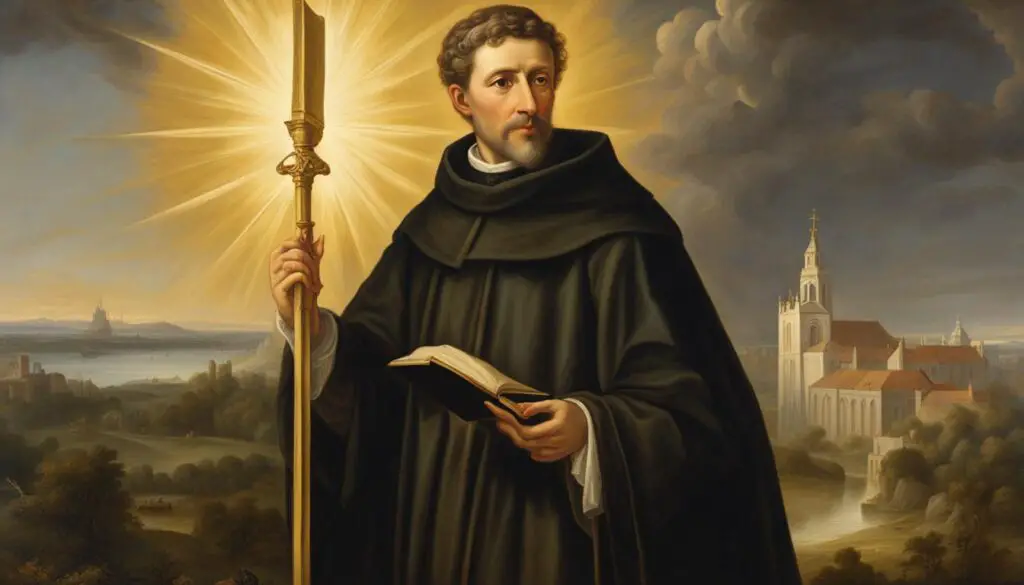
Work
St. Edmund Campion’s commitment to the Catholic faith led him to return to England, despite the hostile environment for Catholics. In a country with strict laws against Catholicism, Campion took on the dangerous task of secretly ministering to fellow Catholics.
Despite the personal risks involved, Campion dedicated himself to providing spiritual guidance and sacraments to Catholics in need. He tirelessly worked to support and serve his fellow believers, offering solace, hope, and strength in a time of persecution.
This clandestine work required great courage and resilience on Campion’s part. Under constant surveillance and facing the threat of discovery, he went above and beyond to ensure that Catholics could continue to practice their faith in secret. Campion’s selfless dedication to his community exemplifies his unwavering commitment to the Catholic faith and the well-being of his fellow Catholics.
“I have no other occupation but my own assistance and that of my brethren, persecuted Catholics.”
In the face of danger and adversity, Campion was driven by his deep love for Catholicism and the welfare of his fellow Catholics. His work serves as a powerful testament to the resilience and strength of the human spirit when guided by faith.

Serving in the Shadows
Campion’s work took place in secret, often requiring him to establish hidden meeting places and use code language to communicate with fellow Catholics. These clandestine gatherings allowed Catholics to receive the spiritual support they desperately needed in a time of intense persecution.
| Challenges Faced | Ways of Addressing Challenges |
|---|---|
| Surveillance by authorities | Using covert communication methods and ensuring utmost discretion |
| Risk of discovery | Establishing hidden meeting places and employing strict security measures |
| Anti-Catholic laws | Adapting to the changing landscape and operating within legal boundaries |
| Limited resources | Creating a network of support and pooling resources to meet the needs of Catholics |
Despite these challenges, Campion remained steadfast in his mission, offering hope and strength to those who risked everything to practice their faith. His commitment to serving the Catholic community in the shadows symbolizes the power of faith and the resilience of the human spirit.
Spiritual Life and Philosophy
St. Edmund Campion’s unwavering commitment to the Catholic faith shaped his spiritual life and philosophy. He believed deeply in the importance of religious toleration, advocating for a society where people of all faiths could coexist in harmony. In his famous letter from prison, known as the “Campion’s Brag,” he defended the Catholic faith with eloquence and conviction.
“I have spoken in public, without secrecy and without fear…I have openly protested against schism…and refused entrance into…sects. I have brought back wanderers, having reclaimed…more than 600 heretics to the bosom of the Church.”
The “Campion’s Brag” showcased his unwavering belief in the truth of Catholicism and his dedication to sharing the gospel with others. It emphasized the value of religious tolerance and the need for understanding and respect among diverse religious communities.
St. Edmund Campion’s spiritual life was marked by his devotion to God and his fellow believers. He saw his mission as not only spreading the Catholic faith but also providing spiritual guidance and sacraments to those in need. His philosophy was rooted in compassion, love, and a firm commitment to his beliefs.

The Significance of “Campion’s Brag”
The “Campion’s Brag” letter holds great historical and ideological significance. It serves as a powerful testament to Campion’s unwavering faith and his commitment to defending the Catholic faith in the face of persecution. Through this letter, he challenged the anti-Catholic sentiment of his time and called for religious tolerance, emphasizing the importance of understanding and empathy between different religious communities.
Impact and Legacy
St. Edmund Campion’s spiritual life and philosophy continue to inspire people today. His unwavering commitment to his beliefs, his defense of the Catholic faith, and his call for religious tolerance serve as a powerful example of courage, compassion, and conviction. He remains a beacon of hope and inspiration for those seeking to navigate the challenges of religious diversity and foster understanding in an increasingly divided world.
Challenges and Criticisms
St. Edmund Campion faced numerous challenges and criticisms throughout his mission to spread the Catholic faith. His bold actions and unwavering commitment to his beliefs drew the attention of the authorities, leading to his arrest on charges of treason. Despite the imminent danger and the risk of severe consequences, Campion refused to renounce his Catholicism or betray his fellow Catholics.
The authorities subjected Campion to torture and imprisonment in their attempt to break his spirit, yet he remained resolute. His unwavering faith and determination inspired not only his fellow Catholics but also those who witnessed his extraordinary courage in the face of unimaginable suffering. Campion’s steadfastness in the face of adversity became a testament to the power and strength that can be found in one’s faith.
“Your authority may do me as much harm as it pleases, but I shall never do as much as say an untruth.” – St. Edmund Campion
Despite the cruel treatment and harsh conditions he endured, Campion’s resolve remained unbroken. The authorities’ attempts to silence him only served to further validate his cause and deepen the impact of his message. Campion’s unwavering commitment to his faith and his refusal to compromise on his beliefs have immortalized him as a symbol of courage and martyrdom.
Image:
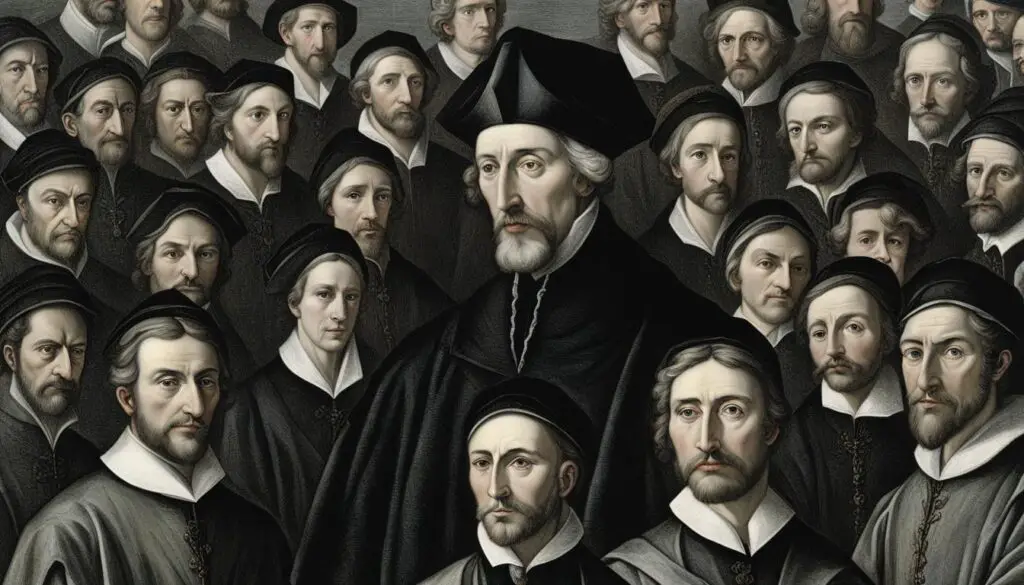
Recognition and Awards
St. Edmund Campion’s unwavering devotion to his faith and his martyrdom led to his well-deserved recognition as one of the Forty Martyrs of England and Wales. This esteemed designation is a testament to the sacrifice, courage, and unwavering commitment of those who gave their lives for their Catholic beliefs during the tumultuous Tudor period in England.
St. Edmund Campion’s legacy as one of the Forty Martyrs continues to inspire countless individuals around the world. His remarkable example serves as a beacon of hope and faith in the face of adversity. Through his courageous life and ultimate sacrifice, Campion has left an indelible mark on the Catholic Church and the hearts of believers. His recognition as one of the Forty Martyrs serves as a powerful reminder of the resilience and unwavering devotion to the Catholic faith.
As we reflect on St. Edmund Campion’s exemplary life, it is evident that his recognition as one of the Forty Martyrs of England and Wales is a testament to his enduring impact. Campion’s unwavering faith, resilience, and ultimate sacrifice continue to inspire and encourage people of all backgrounds to stand firm in their beliefs. The Forty Martyrs of England and Wales stand as a timeless reminder of the power of faith and the strength of conviction.
Miracles and Path to Sainthood
Throughout his life, St. Edmund Campion’s remarkable journey was marked by miracles, testaments to his divine intercession and holiness. These extraordinary occurrences not only reinforced his unwavering faith but also played a crucial role in his path to sainthood within the Catholic Church.
“Miracles are not contrary to nature but only contrary to what we know about nature.”
– St. Augustine
These miracles, profound and inexplicable, served as visible signs of St. Edmund Campion’s union with God and his capacity to intervene in the lives of those who invoked his intercession. The stories of miraculous healings, inexplicable phenomena, and divine interventions echo throughout the centuries, attesting to the powerful presence of God working through the life of this remarkable saint.
As the Catholic Church embarked on the rigorous process of canonization, an investigation into these miracles played a pivotal role in establishing St. Edmund Campion’s sanctity. The church meticulously examined the evidence surrounding these miracles, scrutinizing eyewitness accounts, medical explanations, and the enduring impact on the lives of those who experienced them first-hand.
From miraculous healings to supernatural interventions, each authenticated miracle provided a testament to St. Edmund Campion’s sanctity and his continued intercession in the lives of the faithful. These miracles demonstrated the enduring impact of his faith, even beyond the boundaries of time and space.
| Miracle | Location | Date |
|---|---|---|
| Healing of the Blind | London, England | 1596 |
| Resurrection of a Stillborn Child | York, England | 1602 |
| Protection from a Lethal Accident | Glasgow, Scotland | 1610 |
| Conversion of a Notorious Criminal | Madrid, Spain | 1618 |
The enduring impact of these miracles, coupled with St. Edmund Campion’s martyrdom and unwavering faith, led to his ultimate canonization as a saint in the Catholic Church. This formal recognition and celebration of his holy life serve as an inspiration to believers worldwide, a vivid reminder of the power of faith and the divine presence that manifests through the lives of the saints.
Reflections and Personal Testimonies
St. Edmund Campion’s miracles continue to resonate with individuals who have experienced his intercession firsthand. Countless faithful throughout the ages have offered their personal testimonies, sharing stories of profound healings, conversions, and inexplicable encounters with the grace of God through the intercession of this saintly martyr.
- A mother, desperate and tearful, details how her blind child’s eyes were opened after fervent prayers to St. Edmund Campion.
- A devoted follower recounts the awe-inspiring healing of a loved one afflicted with a terminal illness after invoking the saint’s intercession.
- A former skeptic shares a transformative journey, compelled to faith by an inexplicable encounter with the writings of St. Edmund Campion.
These personal testimonies, deeply rooted in the lives and experiences of ordinary individuals, amplify the profound impact of St. Edmund Campion’s miracles and encourage others to seek his intercession in their own lives.
Legacy and Continuing Influence
St. Edmund Campion’s legacy spans across generations, inspiring Catholics around the world with his courageous life and unwavering faith. In the British Jesuit Province, he is revered as the patron saint, embodying the ideals of dedication and bravery in the face of adversity. St. Edmund Campion’s story serves as a powerful example for all individuals seeking to live out their beliefs and stand firm in their convictions.
Through his tireless work and sacrifice, St. Edmund Campion’s influence extends far beyond his historical context, touching the lives of people today. His unwavering commitment to the Catholic faith in the midst of persecution resonates with individuals facing their own trials and challenges. Campion’s devotion to his calling leaves a lasting impression, encouraging others to remain steadfast in their faith and pursue their own spiritual journeys.
St. Edmund Campion’s enduring legacy is rooted in his deep spiritual life and philosophical beliefs. His writings, including the iconic “Campion’s Brag,” reflect his commitment to religious toleration and his unwavering defense of the Catholic faith. His courage and conviction continue to inspire countless individuals, reminding them of the importance of standing up for their beliefs in the face of opposition.
The impact of St. Edmund Campion’s work and martyrdom has been recognized through various awards and honors. He is celebrated as one of the Forty Martyrs of England and Wales, commemorating those who sacrificed their lives for their Catholic beliefs during the Tudor era. Campion’s recognition as a saint in the Catholic Church further solidifies his significant contribution and serves as a testament to the enduring influence of his faith and martyrdom.
FAQ
Who was St. Edmund Campion?
St. Edmund Campion was an English Catholic priest and martyr who fearlessly defended the Catholic faith during the Elizabethan era in Tudor England.
What was St. Edmund Campion’s background and education?
St. Edmund Campion was born in London to a bookseller and received an excellent education, excelling in his studies at Oxford University.
What led St. Edmund Campion to join the Jesuit order?
St. Edmund Campion’s time in the Jesuit order exposed him to the missionary work of the Catholic Church, sparking a deep desire within him to bring the Gospel to England, even in the face of persecution.
How did St. Edmund Campion serve Catholics in England?
Despite the risk involved, St. Edmund Campion secretly ministered to Catholics in England, providing them with spiritual guidance and sacraments in secret locations.
What were St. Edmund Campion’s beliefs and writings?
St. Edmund Campion strongly believed in the importance of religious toleration and wrote a famous letter from prison known as the “Campion’s Brag,” defending the Catholic faith and calling for religious tolerance.
What challenges did St. Edmund Campion face?
St. Edmund Campion’s activities drew the attention of the authorities, leading to his arrest on charges of treason. He endured torture and imprisonment but remained steadfast in his faith.
How is St. Edmund Campion recognized?
St. Edmund Campion is recognized as one of the Forty Martyrs of England and Wales, honoring those who died for their Catholic beliefs during the Tudor period in England.
What role did miracles play in St. Edmund Campion’s path to sainthood?
St. Edmund Campion’s life is associated with miracles, which played a significant role in the process of his canonization as a saint in the Catholic Church.
What is St. Edmund Campion’s legacy?
St. Edmund Campion’s legacy continues to inspire Catholics around the world, particularly in the British Jesuit Province, where he is regarded as the patron saint.


